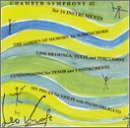| All Artists: Leo Kraft, Paul Hostetter, George Rothman, Christopher Oldfather, Mark Bleeke Title: Leo Kraft: Chamber Works Members Wishing: 1 Total Copies: 0 Label: Albany Records Original Release Date: 1/1/2000 Re-Release Date: 12/18/2001 Genres: Pop, Classical Styles: Vocal Pop, Chamber Music, Historical Periods, Classical (c.1770-1830), Symphonies Number of Discs: 1 SwapaCD Credits: 1 UPC: 034061048923 |
Search - Leo Kraft, Paul Hostetter, George Rothman :: Leo Kraft: Chamber Works
 | Leo Kraft, Paul Hostetter, George Rothman Leo Kraft: Chamber Works Genres: Pop, Classical
|
Larger Image |
CD Details |
CD ReviewsImpeccably Crafted Music of Variable Interest J Scott Morrison | Middlebury VT, USA | 05/10/2003 (3 out of 5 stars) "Leo Kraft (b. 1922) was a long-time professor at Queens College and possibly best known in that role and as a writer of technical books on music. But he also has been a prolific composer. This disc contains chamber music in various instrumental combinations. "Six Pieces for Violin and Piano," impressively played by Renee Jolles, violin, and Christopher Oldfather, has the violin front and center; the piano truly is, for most of the work, an obbligato instrument. The music in this and all the other works recorded here, save possibly the "Chamber Symphony," is in an impressively crafted, astringent, post-Hindemithian style, often veering into atonality and, sadly, there is little that is memorable. In the "Six Pieces" I was struck by the atmosphere of 'Ombre.' "Line Drawings" for flute and percussion, also very impressively played by dedicatee Paul Dunkel (who plays flute, alto flute, and piccolo), with Michael Lipsey, percussion, strikes me as dry and forgettable except for the perky fife-and-drum fourth movement."The Garden of Memory" for harpsichord is played by Oldfather on a perculiar sounding harpsichord; could there be added reverb? It uses free tonality to explore baroque forms, a toccata and fugue manqué. "cummingsong" for tenor and chamber group is set to four e e cummings poems in slightly hysterical (perhaps expressionist is the better term) style and sung drily by tenor Mark Bleeke. Finally, a piece that struck a chord with me: "Chamber Symphony No. 2, for Sixteen Instruments," conducted by George Rothman (conductor of the terrific Riverside Symphony in New York). The Chamber Symphony has some real juice in it, employs some jazzy, Bernsteinian rhythms and harmonies, features some creative percussion licks, and it swings in its outer movements. All of the music here is unmistakably that of an American academic and much of it sounds dated. Still, the Chamber Symphony is worth hearing, and indeed if the style described is your dish you can be assured that the performances are lovingly prepared and presented.Scott Morrison"
|

 Track Listings (19) - Disc #1
Track Listings (19) - Disc #1